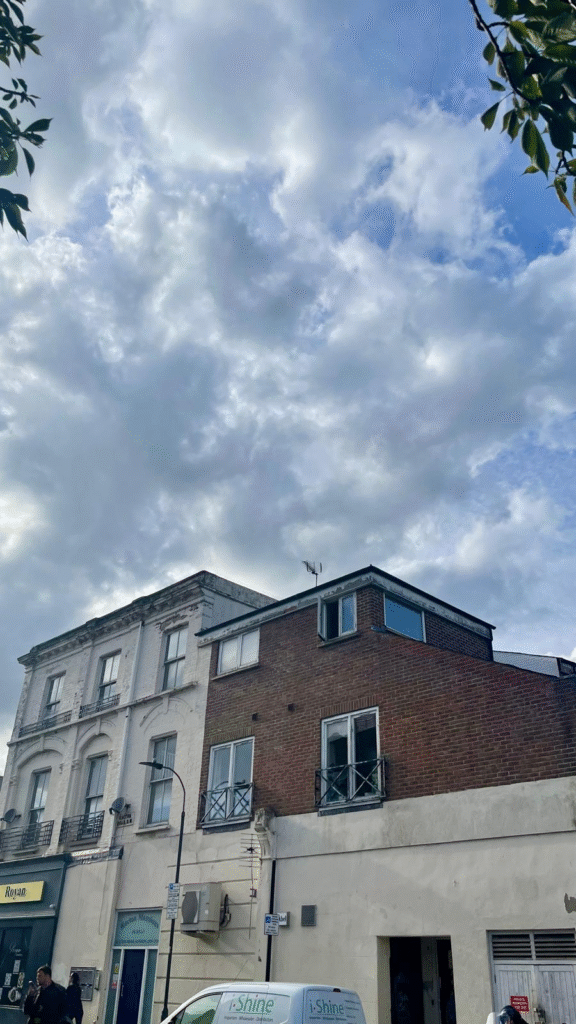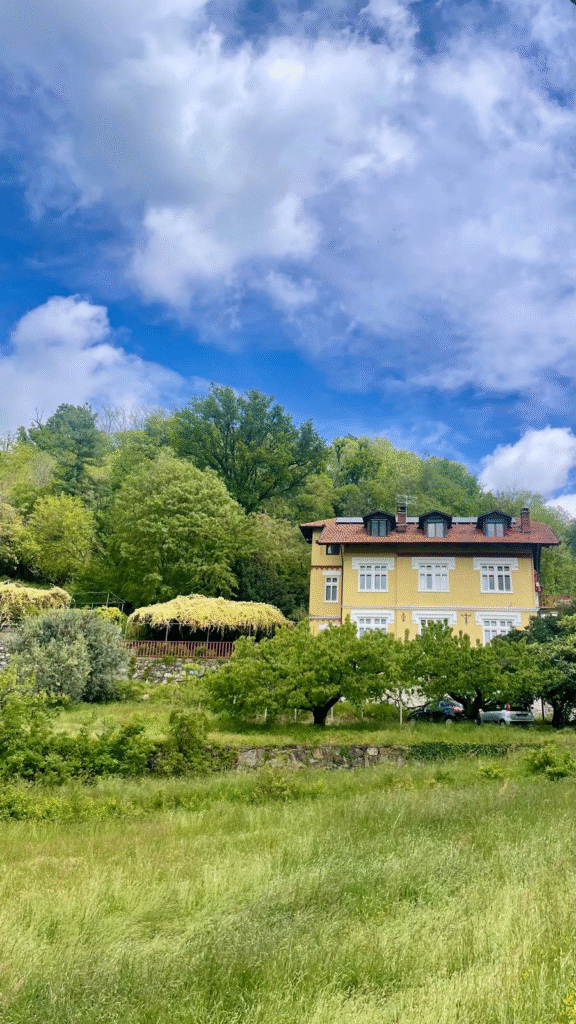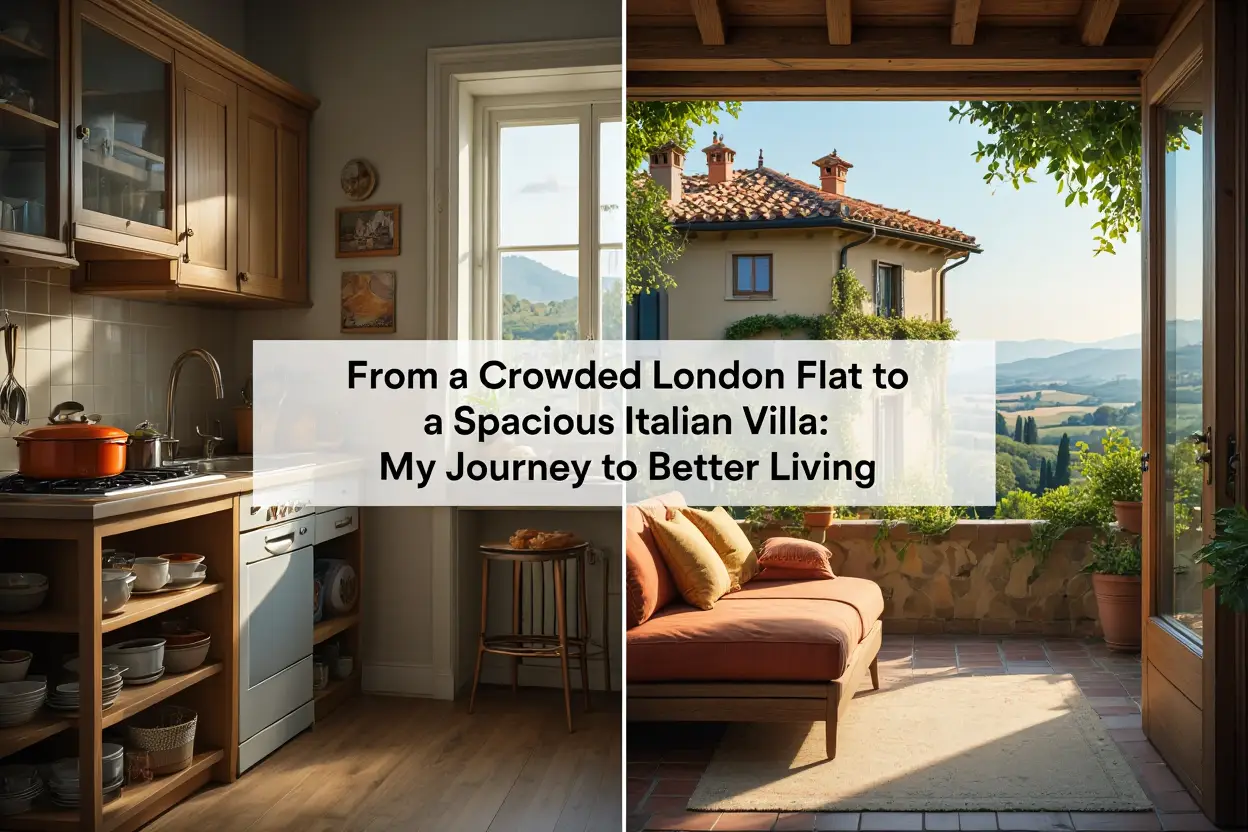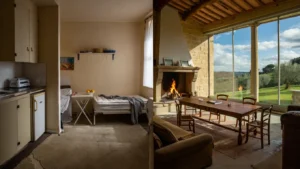When people ask me why I left London, I usually say: “Because I was paying over two grand a month to share a tiny terrace with pigeons.” That normally gets a laugh, but it’s also not far from the truth.
Let me take you back to Rackton Road in Fulham, the place that shaped my twenties and thirties, swallowed my bank account, and eventually pushed me into a villa in rural Italy.
Life on Rackton Road

In March 2017, I moved into a two-bed flat with a terrace in the Fulham/West Kensington/West Brompton triangle.
Sounds glamorous when you say it quickly, doesn’t it?
The reality: nice flat, but hardly palatial.
Rent was £1,600 a month, and once you added in council tax, bills, and the general cost of being alive in Hammersmith & Fulham, the total sat at roughly £2,100.
It was manageable, but not exactly comfortable.
After COVID, rent shot up and flats like mine were being listed for £2,300–£2,600 a month. That’s an extra holiday or two every single month… gone. And to make it even more ironic, I actually owned two other flats in West Drayton but didn’t want to live there. They were better suited for tenants, not me.
So, I stayed in my rented Fulham spot, working away, until I eventually started doing the math and thinking: “Hang on a minute…”
The London Buying Dilemma
Post-COVID, I started scoping out the market to buy something locally. What I found was equal parts depressing and absurd.
A shoebox flat? £600k–£650k.
A like-for-like or slightly nicer place than mine? £800k–£900k.
And while I could have technically gone in with a minimal deposit and a hefty mortgage, the monthly repayment would’ve been £3,000–£3,500.
Now, I’m not a financial genius, but spending that much for a flat barely bigger than a shipping container didn’t exactly scream “good decision.” Especially when my work was remote and I had no actual reason to stay stuck in London, other than habit and Deliveroo.
A Wedding, A Move, A Villa

In August 2023, I married Daniela, who is Italian and runs her own Pilates and osteopathy business. Two months later, we moved to Italy, near Lake Viverone in Piedmont.
Our new home? A four-floor villa.
Yes, four floors. Each floor is basically the size of my old London flat. There are four bathrooms (three actually work, but that still beats one tiny London bathroom where you can brush your teeth and wash your feet at the same time).
There’s a huge garden, a view of the lake, and enough space that our dog Ken can run laps without bumping into furniture.
And here’s the kicker: the rent is €1,900, which is about £1,700. Add bills, and it comes out to €2,100 (£1,850). That’s less than I was paying in London, for about three times the space. Try finding that in Zone 2.
The Cost of Living Contrast

My Home in Italy
This is where Italy wins hands-down.
- Cappuccino: €1.50. In London, that wouldn’t even cover the extra oat milk surcharge.
- Weekly groceries: Think Waitrose quality but Tesco pricing. The food is fresher, mostly local, and tastes better.
- Eating out: Still cheaper, unless you go for a tourist-trap restaurant, which we avoid.
In London, I was budgeting constantly, and every little treat felt like financial sabotage.
In Italy, the daily expenses don’t feel like punishment.
The only downside is that Deliveroo and Uber don’t exist in our town, which means if I want takeaway, I have to actually talk to someone on the phone. Tragic.
Taxes and Bureaucracy: The Italian “Adventure”
Of course, it’s not all sunshine, cappuccinos, and lake views. Italy has bureaucracy that makes the London property market look like Amazon Prime.
Moving money from the UK to Italy? My accountant nearly fainted when I mentioned transferring £100k+. The tax hit would be brutal. Which means if I want to buy property here, I need to buy outright, and that’s a serious lump sum to move across borders.
Getting residency approved was another saga.
Despite being married to an Italian citizen, it took a year and a half to get the paperwork sorted.
You need a paid PEC email just to access the government website, which then tells you to call a number, which then tells you to book an appointment, which doesn’t exist. It’s like a Kafka novel, only with worse coffee while you wait.
But, in the end, persistence (and Daniela’s patience) won. Residency approved.
Why It Works
The move made sense because my work is fully remote. I pay myself around £65k–£70k a year, and nothing about my income depends on me sitting in a tiny London flat. That freedom was the golden ticket.
Daniela runs her Pilates and osteopathy practice from home, so she’s equally comfortable here. In fact, she’s happier, as she’s near family, in her own country, and surrounded by people who actually understand her when she orders at a café.
The quality of life upgrade is hard to overstate: more space, better food, fresh air, and a healthier lifestyle. My daily runs with Ken are on country trails, not dodging traffic on Fulham Palace Road.
Why Buying in London Wasn’t Worth It
London’s property market has become a playground for wealthy international investors.
Local buyers are constantly priced out, and post-Brexit plus post-COVID pressures only made it worse.
Even if I’d managed to scrape together a mortgage for £800k, what was I buying into? A flat the size of my current bathroom, with neighbours arguing through paper-thin walls, and no guarantee the value would hold steady.
By comparison, €500k in Italy gets you a villa like ours. €60k–€80k gets you a smaller flat, but still something liveable. The only snag? Without Italian financial history, I can’t get a mortgage here. So it’s buy outright or bust.
What I Miss About London
It’s not all roses. There are a few things I miss:
- Convenience: Deliveroo, Uber, and the ability to get a burrito at 11 p.m. don’t exist here.
- Friends and family: Regular trips back help, but it’s less frequent now due to residency rules.
- Variety: London spoils you with options: food, culture, events. Small-town Italy is quieter, sometimes too quiet.
But none of those outweigh the space, the calm, and the better day-to-day living.
Advice for Anyone Considering the Move
If you’re tempted to do something similar, here’s my advice:
- Be realistic. It’s not a problem-free switch. Bureaucracy is frustrating, taxes can sting, and you’ll miss certain conveniences.
- Remote work helps. If your job requires you to be in London daily, the move doesn’t work. But if you’re remote, the trade-off is much easier.
- Consider lifestyle. If you love countryside walks, gardening, or spending time at home, it’s fantastic. If you need constant nightlife, you’ll go mad.
- Check finances carefully. The cost of living is lower, but property ownership rules are tricky. Talk to an accountant before moving big sums.
So, Was It Worth It?
Absolutely. Moving from a cramped London flat to a spacious Italian villa has been one of the best decisions I’ve made. Not just for me, but for my wife, my dog, and even my own mental health.
London will always be special to me. It’s where I built my businesses, made lifelong friends, and spent some of my most important years. But at some point, you have to ask yourself whether paying £3,000 a month to stare at a brick wall is really the dream.
For me, the dream is a villa near a lake, with four bathrooms, a happy wife teaching Pilates downstairs, and a dog sprinting across the garden.




